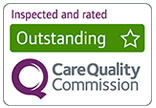Claire House see safeguarding as one of our key responsibilities and we recognise that safeguarding is a shared responsibility with the need for effective joint working with other agencies. In order to protect Children, Young People and Adults at risk from harm, and achieve effective joint working there must be constructive relationships at all levels, promoted and supported by:
- A commitment of senior managers and board members to seek continuous improvement with regards to safeguarding adults and children within the work of the organisation.
- Clear lines of accountability within the organisation for safeguarding.
- Service developments that take account of the need to safeguard all service users, and informed, where appropriate, by the views of service users.
- Staff training and continuing professional development so that staff have an understanding of their roles and responsibilities in regards to safeguarding children, adults at risk, looked after children, Mental Capacity Act, and Prevent.
- Appropriate safeguarding supervision and support for staff in relation to safeguarding practice.
- Safe working practices including recruitment and vetting procedures.
- Effective interagency working, including effective information sharing.
We keep safeguarding at the heart of our practice, with particular focus on the daily-lived experiences of the child or young person, promoting choice and independence following the six principles of adult safeguarding and a strengths based approach to our work with families recognizing what is going well but acknowledging what is also not working so well.
Safeguarding children at Claire House
- We ask for any safeguarding information to be disclosed as part of the referrals process.
- Our role is to help inform and support any children and their families who are open to social care.
- We will always attend safeguarding meetings for Child Protection (CP) cases and Child in Need (CIN).
- CIN cases which are not for ongoing concerns but more due to the complexity of care we will try our best to attend or send a report.
- We are here to help our families get through those difficult moments.
- We flag all our children who are open to social care so we can support those individuals.
- We keep the child at the centre of our thoughts to make sure their daily lived experiences are well considered and understood.
Safeguarding adults at Claire House
- Safeguarding adults starts from 18 years of age but we also apply the principles of the Mental Capacity Act (2005) for all our young adults once they reach 16 years of age.
- We uphold the six principles of Adult safeguarding – Empowerment – Prevention –Proportionality – Protection – Partnership and Accountability.
- We complete capacity assessments on every admission and daycare session for those young adults (over 16) who are assessed as lacking the capacity for specific decisions in line with the mental capacity act.
- We complete Deprivation of Liberty Safeguard applications for all those young adults (over 18) who lack the capacity to consent to stay at the hospice.
- We promote the voice of the young adult and advocate for them where necessary.
- We support our young adults to make informed decisions and choices through providing them with all the relevant information.
- We promote independence and control for those young adults who can consent and communicate for themselves to complete their own care plans.
The expectation is that safeguarding children is ‘everyone’s business’, therefore training needs to be at the appropriate level and flexible to meet the various job roles within the organisation. The Intercollegiate Document (Jan 2019) published by the Royal College of Nursing sets out a competency framework that enable staff to effectively safeguard, protect and promote the welfare of children and young people. The competences are a combination of skills, knowledge, attitudes and values that are required for safe and effective practice. The competences are separated into 6 levels:
- Level 1: non-clinical staff working in healthcare settings (admin, volunteers)
- Level 2: minimum level required for clinical & non-clinical staff that have some degree of contact with children and young people and /or parents/carers (assistant care team staff, house-keeping, kitchen, maintenance, play and in-house therapy staff)
- Level 3 (Core): All medical and clinical staff working with children and young people and/or their parents/carers who could potentially contribute to assessing, planning, intervening and evaluating the needs of a child or young person and parenting capacity where there are safeguarding/ child protection concerns (ALL nurses, Rapid Response staff, medical staff, & therapists working in-house or in the community)
- Level 3 (Specific): All Hospice Department leads and those involved with recruitment to care service roles or managing allegations against staff.
- Level 4: Named professionals (Hospice Manager, Young Adult Coordinator, Director of Clinical Services as Registered Manager).
A copy of our policies and procedures are available on request

